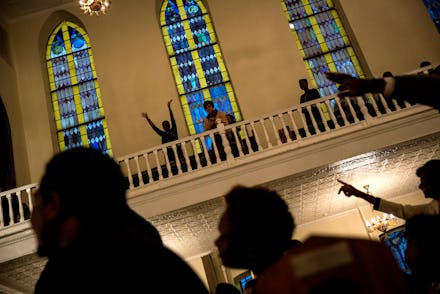What These Religious Leaders Want America to Know in the Wake of the Charleston Massacre

Many people across the country are infuriated and heartbroken because of fatal shooting of nine people Wednesday night at the Emanuel African Methodist Episcopal Church in Charleston, South Carolina. As we remember the Rev. Clementa Pinckney, Tywanza Sanders, Cynthia Hurd, Sharonda Coleman-Singleton, Susie Jackson, Ethel Lee Lance, Daniel Simmons, the Rev. Depayne Middleton Doctor and Myra Thompson, let us also remember the generosity of spirit and hospitality they practiced before their lives were brutally taken by a lone white racial supremacist.
One of the principle features of Christian theology is the notion of invitation. The slain graciously welcomed the man who would later murder them. This is the perverted irony of this terrorist act, and it is hard to make sense of it all. Because religion and spirituality are key features of social life in the U.S., Mic invited Christian leaders from across the country to respond to the shooting and offer words of encouragement to move us forward.
The Rev. Osagyefo Sekou, of the Fellowship of Reconciliation:
"They were killed because of their love. They welcomed a stranger and gave him home as he plotted their demise. This is the best of black church — unconditional love. To love in the face of white supremacy is a revolutionary act."
The Rev. Valerie Bridgeman, president & CEO of WomanPreach! Inc. and associate professor of homiletics & Hebrew bible at the Methodist Theological School in Ohio:
"I've been glued to social media and corporate media since nine people were murdered in an historic AME church, Mother Emanuel. I can hardly turn my eyes and ears away. I honestly don't know what I'm listening for or hoping to see. It's not as if this incident actually was 'unthinkable' or 'unimaginable.' We live in a racist country, where racist-induced violence seems on the uptick. I am grieved. But I am not surprised. And that makes me sad."
"It's not as if this incident actually was 'unthinkable' or 'unimaginable.' We live in a racist country ... I am grieved. But I am not surprised."
"I am angry that people are being told to 'heal' and 'move on' and 'recover' when they (we) are still really in a state of shock. The full impact of these horrific racist terroristic murders haven't sunk in yet. We rush too soon to forced 'peace' or 'reconciliation' or 'forgiveness.' It's not healthy, physically or spiritually. ... I'm righteously mad. Righteously angry. And it's in my prayers and my thinking as I prepare to preach Sunday."
Damien Conners, executive director of Excel Bridgeport and former national executive director of the Southern Christian Leadership Conference:
"Rage is the only appropriate response to the tragedy in Charleston, South Carolina. The rage of witnessing black lives, time and time again, wiped away by the latent and profoundly overt manifestations of racism should consume the soul of our nation. Radical, righteous rage should call us to the type of love that will not allow us to rest until we awaken the slumbering conscience of a nation entranced by the fear-mongering othering of media outlets and the pacifying politicking of elected officials who make excuses for institutional racism."
"The rage of witnessing black lives, time and time again, wiped away by the latent and profoundly overt manifestations of racism should consume the soul of our nation."
"Rage right now is right, but it must be righteous. Dr. King's reminds us that, 'Hate cannot drive out hate, only love can do that.' Our rage should be harnessed in deep love of self and community. Love is not passive. Love is aggressive and active. Our rage and love of self and community cannot be retaliatory and reflexive; it must be a deliberate, directed force of radical opposition. Our collective love of self and community must invest in action, policy and conversation that will not allow our neighbors to be murdered by America's brokenness. Righteous rage reinforces our love of self and community; and our righteous rage should thrust us into realm of unrelenting movement toward the redemption of our nation's soul. America's next president must be one who will address the national menace of racism."
The Rev. Dr. Amy Butler, senior minister of New York City's Riverside Church:
"Tragedies such as these confront us with hard questions. As people of faith, how can we speak words of peace and reconciliation when even our houses of worship cannot provide sanctuary from the violence and hatred in our world? How can we proclaim all lives are cherished and beloved by God when our brothers and sisters are targeted for the color of their skin? How can we hope for a culture of peace and justice when we do not even have the courage to limit the use of deadly weapons in our society?
Our lack of resolve, our collective failure, has created this litany of tragedies. Still, it is in these moments of despair that we need each other most. We need our churches and communities to provide comfort and to call us to action with the deep conviction of our faith – a faith that gives us the courage to speak words of hope into a culture of death, a faith that compels us to work for justice and God's peaceable kingdom on earth as in heaven, a faith that assures us love and not hatred will win in the end."